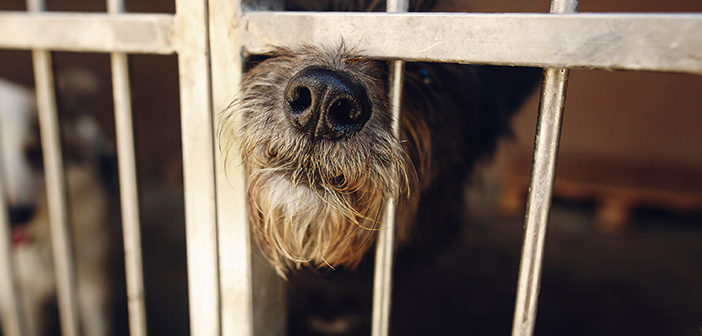Every summer, large amounts of dogs are locked up in little cages and then transported in trucks in the middle of the night. On the inside of the trucks, one can hear a faint whimper, quickly dying off. The vehicle stops abruptly, and the dogs slam into the cold bars of their pens. The metallic smell of blood rises, and one can almost grasp the hopelessness that lies in the air. Yes, The Yulin Dog Meat Festival has begun; that time of the year where dogs, cats, pigs, fox, and geese from all over China are brought to slaughterhouses, just like the one the truck is on its way to. The Festival began in 2009, in Yulin and is a revival of the Chinese tradition of eating dog meat in the hot summer, in order to cool off and receive health. Every year, thousands of dogs are beaten, kept in small cages, and eaten during the ten day festival.
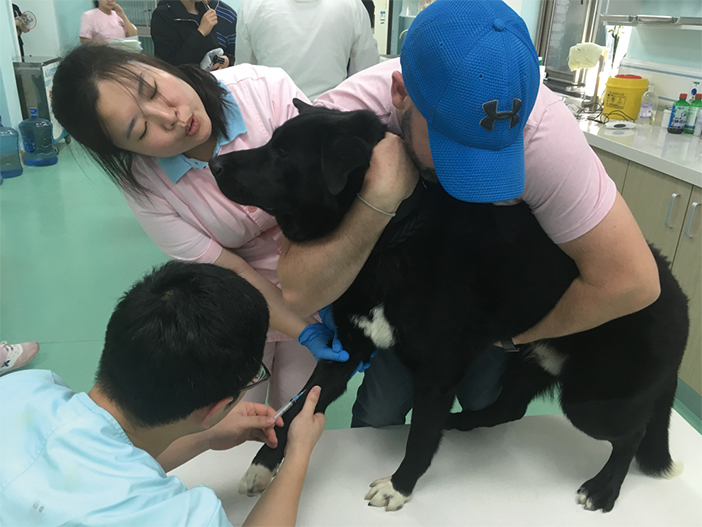 Unexpectedly, the doors of the truck open and two policemen walk in. They take a short look at the dogs, then shrug, and get on with their business. The dogs stick their little noses out to breathe in the fresh night air. What happened? Well, since you need a special license to sell dog meat and the drivers of this truck didn’t have it, the cargo is classified illegal, and they are arrested. Then everything happens very quickly. The dogs are separated and brought to different places.
Unexpectedly, the doors of the truck open and two policemen walk in. They take a short look at the dogs, then shrug, and get on with their business. The dogs stick their little noses out to breathe in the fresh night air. What happened? Well, since you need a special license to sell dog meat and the drivers of this truck didn’t have it, the cargo is classified illegal, and they are arrested. Then everything happens very quickly. The dogs are separated and brought to different places.
One of these places is the home of Harrow Beijing Teacher, Ciara Turner. Currently, she is taking care of a mixed breed puppy that resembles a Labrador. She smiles as she takes a good look at the dog. He is not sure what to do, what to think, as he sits there on the living room floor, his tail tucked between his legs. Turner gives him water and time to get used to the situation. “This behavior is not unusual at all,” she says, as she watches the beagle take a sip of water. “Sometimes they even growl at me. But that’s okay; I know that they are scared and often hurt. Look…” She points at the dog´s left shoulder. “Our little puppy here has gotten himself a little injury.” And for sure, there seems to be a flesh wound right at that spot.
But who exactly is Ciara Turner, and why does she take care of these injured animals?
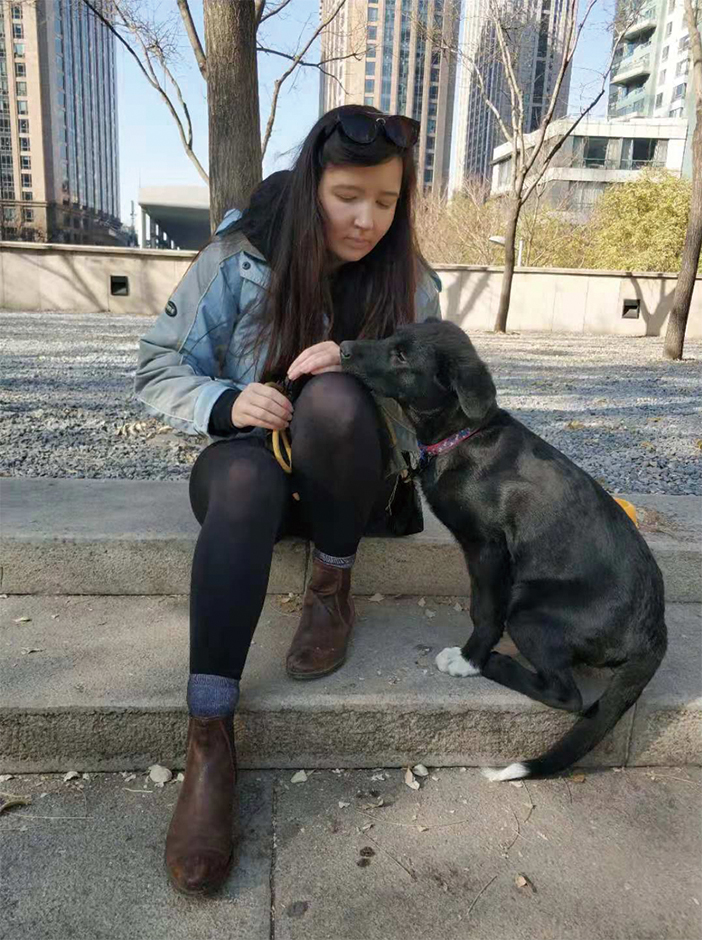 Ciara is part of an organization called Slaughterhouse Survivors, which specializes in cases just like the one involving this dog. It was founded in 2016 by three expat women in Harbin, China. In the beginning, the three teachers, Aimee, Hayley, and Emily, only rescued a few animals from a local slaughterhouse and were horrified at the conditions they were in. So they did it over and over again, rescuing more animals every day and getting help from their friends at first and then from strangers. This little hobby of saving dogs in their free time quickly grew into something bigger, to the point where it is now over 100 volunteers strong, and 800 animals have been rescued. Turner is one of these volunteers here in Beijing. So far, she has taken care of eight animals in the last three years, and she doesn´t plan on stopping any time soon. But with the responsibility of taking care of a rescued animal comes the task of organizing the trip from China to whatever country the animal will be adopted in. That´s right, the unique thing about Slaughterhouse Survivors is that the animals will be adopted in different countries, even continents! Mostly the animals will be brought to the USA, the UK, or Canada, and sometimes even to Russia. Often, an adopter is found through social media, like Facebook, Instagram, or WeChat. Picking a suitable person for the dog can be quite tricky too since they never have the opportunity to meet face to face. Now, a long journey for the little dog mix begins.
Ciara is part of an organization called Slaughterhouse Survivors, which specializes in cases just like the one involving this dog. It was founded in 2016 by three expat women in Harbin, China. In the beginning, the three teachers, Aimee, Hayley, and Emily, only rescued a few animals from a local slaughterhouse and were horrified at the conditions they were in. So they did it over and over again, rescuing more animals every day and getting help from their friends at first and then from strangers. This little hobby of saving dogs in their free time quickly grew into something bigger, to the point where it is now over 100 volunteers strong, and 800 animals have been rescued. Turner is one of these volunteers here in Beijing. So far, she has taken care of eight animals in the last three years, and she doesn´t plan on stopping any time soon. But with the responsibility of taking care of a rescued animal comes the task of organizing the trip from China to whatever country the animal will be adopted in. That´s right, the unique thing about Slaughterhouse Survivors is that the animals will be adopted in different countries, even continents! Mostly the animals will be brought to the USA, the UK, or Canada, and sometimes even to Russia. Often, an adopter is found through social media, like Facebook, Instagram, or WeChat. Picking a suitable person for the dog can be quite tricky too since they never have the opportunity to meet face to face. Now, a long journey for the little dog mix begins.
Meanwhile, Turner has named him Bear. First of all, he has to go to his appointment at the vet, where his wounds will be taken care of. With a new bandage on his shoulder and a smile on his face, Bear returns home. Since he is meant for the UK, a microchip will immediately be injected into him, due to a law, which was launched in 2016, forcing owners to microchip their dogs, or the owner will otherwise face a fine of five hundred British Pounds. Afterward, he is vaccinated against rabies, followed by a thirty-day wait, in which the vaccination takes effect. Now Bear is able to take the Antibody Titer Test, where the number of antibodies in Bear is detected, in order to find out the strength of his body´s immune response. This process costs about RMB 25,000, which Turner pays for herself. Often, rescuers charge 500 pounds to the adopters, but this only covers a part of the costs. Slaughterhouse Survivors heavily relies on donations and the rescuers’ own funds. Then, a blood sample is sent to a lab in Germany to ensure that the animal is resistant to rabies. Now, Bear must wait another ninety days, which is the equivalent to quarantine.
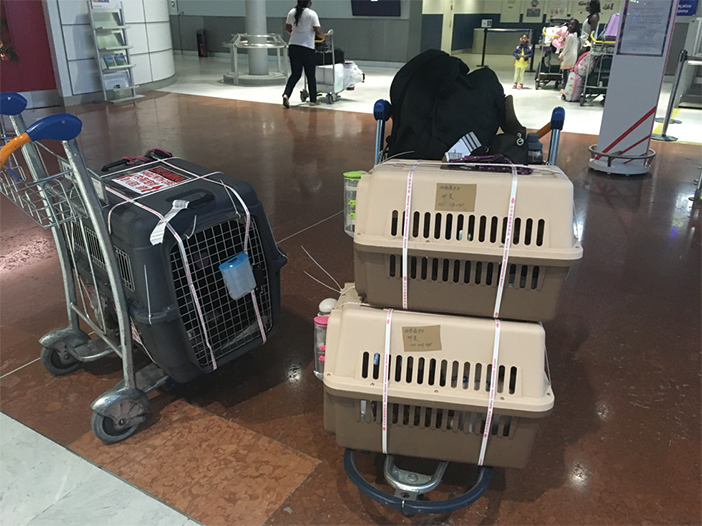 Sadly, the dog has failed the titer test, so the whole process has to start over again. The vaccination against rabies, the thirty days waiting time, the titer test, and the quarantine like days, all has to be redone, which means even more work and money to spend for Turner since she has to pay another RMB 25,000 for the whole process. On average, the procedure takes about four to six months, in which Turner spends one to two hours organizing paperwork and everything else that is necessary about four times a week after work. If she messes something up, it can mean starting over again. Finally, Bear passes the test, which means that Turner now has seven to ten days to take the dog to the official government vets, to get a final health check. If Bear is healthy enough to leave the country, he will receive an Animal Health Certificate. Once that is done, Ciara applies for the exit permit. Now the flight volunteer has seven days to leave China with Bear. If Ciara misses that period of time, she has to get another exit permit.
Sadly, the dog has failed the titer test, so the whole process has to start over again. The vaccination against rabies, the thirty days waiting time, the titer test, and the quarantine like days, all has to be redone, which means even more work and money to spend for Turner since she has to pay another RMB 25,000 for the whole process. On average, the procedure takes about four to six months, in which Turner spends one to two hours organizing paperwork and everything else that is necessary about four times a week after work. If she messes something up, it can mean starting over again. Finally, Bear passes the test, which means that Turner now has seven to ten days to take the dog to the official government vets, to get a final health check. If Bear is healthy enough to leave the country, he will receive an Animal Health Certificate. Once that is done, Ciara applies for the exit permit. Now the flight volunteer has seven days to leave China with Bear. If Ciara misses that period of time, she has to get another exit permit.
The teacher takes Bear with her on to the airplane, and they are on their way to England. “One time,” she remembers, “I was traveling with a dog called Henry. His injuries were still quite severe when I flew him to England, but he wasn’t in pain because of his paralysis. His lower half was in bandages and diapers which I changed every two to three hours in the airplane toilets, and cleaned and helped him to poop and so on.” Luckily, this is not the case for Bear; his wounds have healed up quite well now. When they arrive in England, Ciara and the dog go to a cheap hotel to stay the night. The next day, they meet the adopter, a nice young woman, with a big heart for animals, named Rachael.
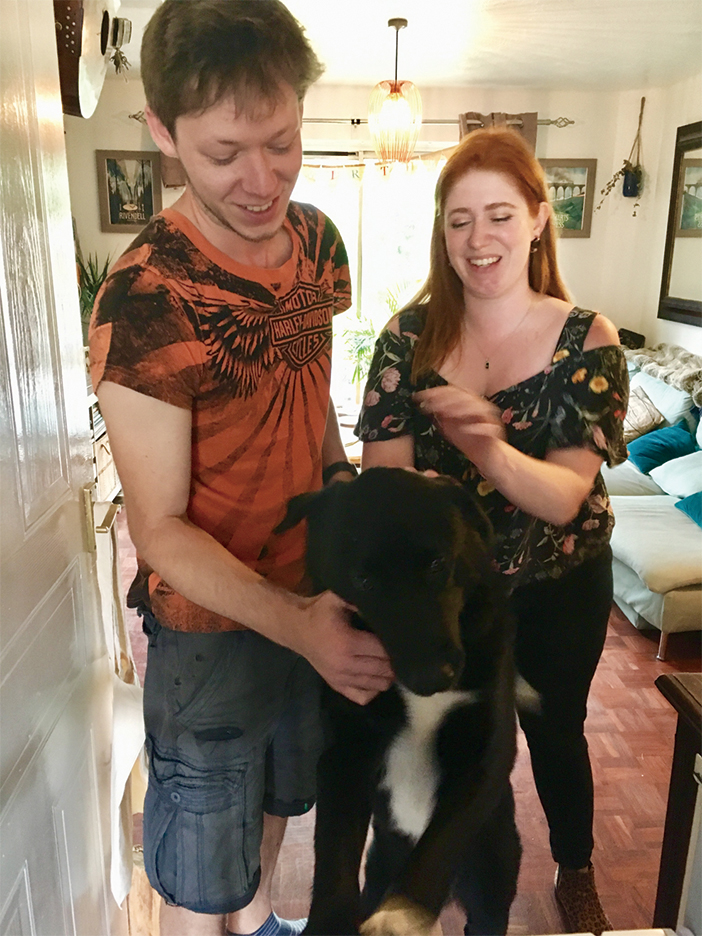 Why would she adopt a dog from China instead of one from England? Wouldn’t that be easier for her? Rachael and her partner Ben have always wanted a dog, and now that they were in a good place in their lives, they felt that they were ready for it. At first, they weren´t sure whether to adopt or shop for a puppy. But then Turner, whom Rachael follows on Instagram, started posting about the charity work for Slaughterhouse Survivors and the mistreatment of stray dogs and other animals in China. “Ben and I are massive animal lovers, we are vegetarian, so our ethics are to protect and be kind to other living things. So it was quite distressing and shocking to see posts from Turner, about the treatment of animals in Beijing”, Racheal explains. All of this seemed even more absurd because the government funds and laws that protect pet animals like cats and dogs in the UK. So when Turner asked if anyone wanted to adopt Bear in Canada, the UK, or the USA, Ben and Racheal put their names on the list. “Dogs over here are still mistreated, and obviously we´d like to help them too, but I think the connection with Turner, the power of social media and the abuse of dogs in China feel a lot closer to home. And all in all, even though dogs over here are mistreated, it is against the law to do so, and there are many people to report this kind of behavior. We also have a lot more kennels for rescued dogs. At the time, Bear´s life seemed to depend on adoption much more than the dogs from shelters here. Not to mention he is a combo of our favorite dog breeds: Labrador and Bernese mountain dog – but that´s just a bonus,” Racheal adds.
Why would she adopt a dog from China instead of one from England? Wouldn’t that be easier for her? Rachael and her partner Ben have always wanted a dog, and now that they were in a good place in their lives, they felt that they were ready for it. At first, they weren´t sure whether to adopt or shop for a puppy. But then Turner, whom Rachael follows on Instagram, started posting about the charity work for Slaughterhouse Survivors and the mistreatment of stray dogs and other animals in China. “Ben and I are massive animal lovers, we are vegetarian, so our ethics are to protect and be kind to other living things. So it was quite distressing and shocking to see posts from Turner, about the treatment of animals in Beijing”, Racheal explains. All of this seemed even more absurd because the government funds and laws that protect pet animals like cats and dogs in the UK. So when Turner asked if anyone wanted to adopt Bear in Canada, the UK, or the USA, Ben and Racheal put their names on the list. “Dogs over here are still mistreated, and obviously we´d like to help them too, but I think the connection with Turner, the power of social media and the abuse of dogs in China feel a lot closer to home. And all in all, even though dogs over here are mistreated, it is against the law to do so, and there are many people to report this kind of behavior. We also have a lot more kennels for rescued dogs. At the time, Bear´s life seemed to depend on adoption much more than the dogs from shelters here. Not to mention he is a combo of our favorite dog breeds: Labrador and Bernese mountain dog – but that´s just a bonus,” Racheal adds.
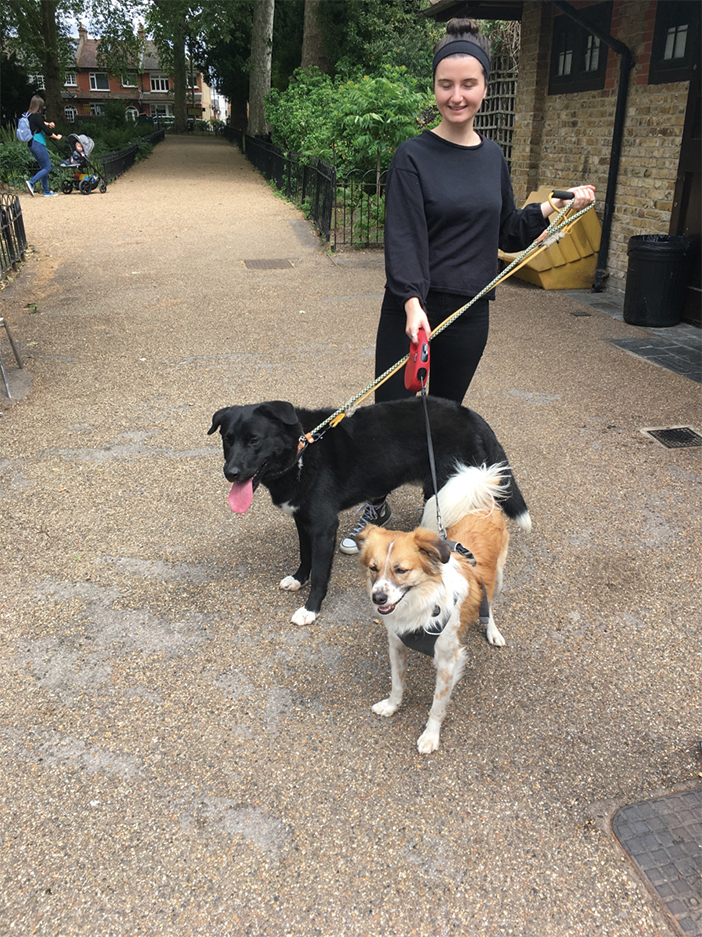 Being a flight volunteer or rescuer takes a lot of work and is quite time-consuming. But all the people working for Slaughterhouse Survivors know it´s worth it. Saving the life of an animal and giving it a happy home is one of the best things you can do. So do you want to participate? You can either help by becoming a flight volunteer, fundraiser, or fosterer. Just write volunteer@harbinshs.com. For further information about the organization, you can check out their Instagram slaughterhouse _survivors or visit the official website harbinshs.com.
Being a flight volunteer or rescuer takes a lot of work and is quite time-consuming. But all the people working for Slaughterhouse Survivors know it´s worth it. Saving the life of an animal and giving it a happy home is one of the best things you can do. So do you want to participate? You can either help by becoming a flight volunteer, fundraiser, or fosterer. Just write volunteer@harbinshs.com. For further information about the organization, you can check out their Instagram slaughterhouse _survivors or visit the official website harbinshs.com.
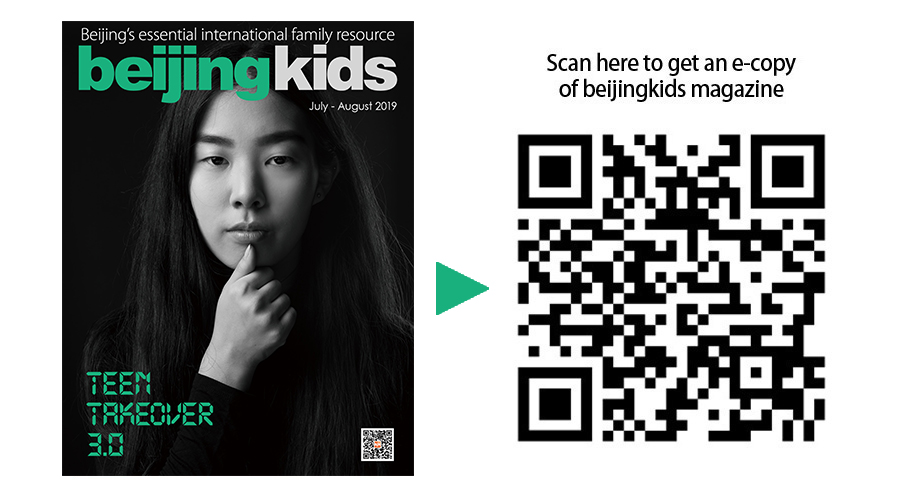
This article appeared in the beijingkids July-August 2019 Teen Takeover issue

